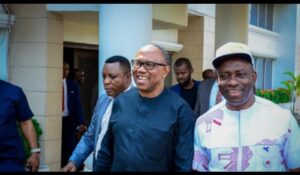Again, Soludo Tackles Obi,.Accuse Him of Betraying Ojukwu’s Legacy Amid 2027 Political Undercurrents
 Political tensions in Anambra have reignited following fresh criticisms from Governor Charles Chukwuma Soludo against former governor and Labour Party presidential candidate, Peter Obi.
Political tensions in Anambra have reignited following fresh criticisms from Governor Charles Chukwuma Soludo against former governor and Labour Party presidential candidate, Peter Obi.
In a recent statement, Soludo suggested that Obi’s political trajectory amounts to a betrayal of the late Dim Chukwuemeka Odumegwu Ojukwu’s legacy, triggering heated responses from Igbo leaders and political observers nationwide.
Soludo, who is widely believed to be nursing presidential ambitions after his tenure as governor, did not mince words in his assessment of Obi’s political decisions. In his widely circulated article,
“History Beckons and I Will Not Be Silent,” Soludo accused Obi of abandoning the All Progressives Grand Alliance (APGA) the party founded with the blessings of Ojukwu for personal political gain.
“Obi swore to remain in APGA as a commitment to Ojukwu’s vision for the Igbo nation. But he left, and now pretends to lead a national movement,” Soludo wrote, asserting that such actions undermine the region’s political unity.
Soludo’s remarks have drawn swift backlash from prominent figures across the Southeast. Former Minister of Education, Prof. Fabian Osuji, condemned Soludo’s comments, calling him “a betrayer of the Igbo cause” and accusing him of leveraging regional sentiments for personal ambition.
The World Igbo Congress (WIC) echoed similar sentiments, stating that Soludo’s attacks on Obi reflect “a betrayal of trust” by someone expected to protect and promote Igbo political interests.
Peter Obi’s camp, however, dismissed Soludo’s accusations as politically motivated. His spokesperson, Dr. Yunusa Tanko, described Obi’s move to the Labour Party as “a broadening of the democratic space,” not a rejection of Ojukwu’s ideals.
“Obi remains committed to the principles of equity, justice, and good governance. His decision to move to a national platform reflects a vision for inclusivity, not betrayal,” Tanko said.
Interestingly, despite the public tensions, both leaders shared a reconciliatory moment at a church service in Awka in late 2022. Photos of the pair embracing circulated widely, with Soludo later describing their feud as “strictly political.”
Yet, with the 2027 elections looming and both men regarded as influential voices in Nigeria’s political future, analysts believe the rift may resurface.
“This is about more than personal grudges,” said political analyst Chibuzo Onuoha. “It’s about who will control the narrative and direction of Igbo politics in the years ahead.”
As the political landscape continues to evolve, the legacy of Ojukwu and who truly upholds it remains a powerful symbol in Nigeria’s southeastern region.







